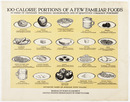The Career of the Calorie. Bodies, Selves and Ability in the USA, 1850-1930
Dr. Nina Mackert (Erfurt University)
This research project traces the career of the calorie in the USA between 1850 and 1930. It asks how the calorie emerged in metabolic experiments and dietary practices and unfolded as a technology of subjectivation.
When calorie counting emerged as a white, middle-class dieting practice in the late 1910s, the calorie was still a rather new concept even in nutrition science. Since the 1880s, scientists had begun to experiment with foods values and human metabolism, establishing the term calorie as measure of the heat value of foods. The calorie’s notion of a precise calculability of bodily efficiency was especially attractive in the Progressive Era. It corresponded with the contemporary “search for order”, as Robert Wiebe has called it. In times of an advancing industrialism, migration and urbanization, Americans turned to scientific expertise and new methods of measuring and classifying in order to understand and improve bodies and society.
The productivity of the calorie for the biopolitical order can hardly be underestimated. By providing an allegedly objective and scientific view on food, the calorie suggested a precise comparison of the diets of different classes and “races.” Caloric knowledge was productive in a range of diverse fields. It shaped the nutritional management of factories, prisons, schools, as well as armies, yielded knowledge on eating ‘right,’ distinct practices of bodies, the materiality of caloric tables as well as meal sizes, nutritional programs and institutions, and not least individuals that understood themselves in relation to the calorie.
By examining the knowledge, institutionalizations, and subjects that the calorie brought forth, the project asks how the calorie contributed to arranging and regulating modern societies around the ideal of an able, self-responsible self. Research questions include: In how far did the “invention” and popularization of the calorie emerged from, established or contributed (to) the ideal of the self-responsible subject by providing a possibility and making it imperative to individually measuring and controlling one’s food intake? What kind of bodies and abilities were connected to the new caloric knowledge and practices of measuring, counting, and dieting? How did caloric knowledge and notions of health and ability produced and how were they shaped and stabilized in laboratory work, practices of measuring, sets of (administrative) rules and policies, curricula, and a wide range of nutritional programs and measures (such as the establishment of agricultural stations, nutrition curricula in schools and colleges, food aid, the organization of hospitals, armies, prisons, etc.)? In short: The project takes the calorie as a lens for historicizing the formation of the social via ability.
Nina Mackert is Assistant Professor of North American History at Erfurt University. In 2012, she received her PhD there with a book on the post-World War II delinquency scare in the USA (published with UVK in 2014). Between 2012 and 2015 she has been working in the research project The Eating Self: A History of the Political in the United States from the 19th to the 21st Century, publishing “’I want to be a fat man / and with the fat men stand’ – U.S.-Amerikanische Fat Men’s Clubs und die Bedeutungen von Körperfett in den Dekaden um 1900,” Body Politics 3/2014. Her most recent publications include “Feeding Productive Bodies: Calories, Nutritional Values and Ability in the Progressive Era US,” Histories of Productivity: Genealogical Perspectives on the Body and Modern Economy, ed. by Peter-Paul Bänziger and Mischa Suter, London: Routledge, 2016. Together with Jürgen Martschukat, she is the editor of the blog foodfatnessfitness.com, and of “Fat Agency,” a theme issue of the journal Body Politics 5 (2016). Her research interests lie in the fields of critical ability studies and North American cultural history, in particular the history of youth and families, bodies, food and nutrition.
Nina Mackert at Erfurt University



